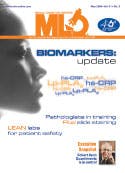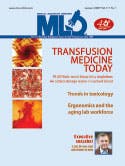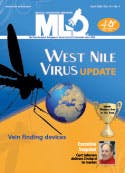Letters to the editor
Readers respond
Please forward my condolences to Dr. Baer's family. I
wrote to him several times and was always amazed at his quick response
with great information. I was shocked to hear of his passing — I had
just sent in another question and learned then that he had just passed
away the week before. It stopped me in my tracks and sent me into a lot
of reflection about myself, my laboratory career, and my interaction
with fellow human beings. Dr. Baer was a great person — a great teacher
through his “Tips” column — and although I never met him, I can tell he
had a great sense of humor and was a person who really cared about other
people and doing the right thing.
—Enid Deibert
Marshall Medical Center Laboratory
Placerville, CA
I must add my condolences to his [Dr. Baer's] family.
I am another “old school" tech who is always looking for updated and/or
correct ways to do things. Sometimes a new tech, or new to us, anyway,
comes in and questions the way we do things. That is a good thing. If I
could not find an adequate answer from other resources, I turned to Dr.
Baer. He never indicated that questions were stupid, or [never asked],
“How come you do not know that already?”
I am sure he knew that he was a “go-to” resource to
resolve questions. His answers were always well-researched, thought-out,
practical. If he did not know, he said so. Rare! And he always got back
to me immediately. If he did not have a ready answer, he promised to
research it. I was amazed when I got a final answer to one of my
questions months later. He also called in other experts to contribute to
the conversation.
We will miss him. MLO is one of the best
respected, timely, useful lab journals. I, too, always looked forward to
Dr. Baer's comments and cut them out and used them as adjunct to our
policies and procedures.
I wish Dr. Karon the best of luck.
—Deb Troutman MT(ASCP)
Laboratory Manager
Edmonds Family Medicine Clinic/PSFP
Edmonds, WA
Editor's note: We sent out our first notice
about Dr. Baer in our April 2009 LABline e-newsletter, and
published
“In Tribute to Dan Baer” in our May 2009 print edition on p. 12 in The
Observatory section.
Heroes in the lab
Medical laboratory professionals work each day on
behalf of sick patients in need of healthcare. Some professionals,
however, extend the reach of their influence far beyond the bounds of
their laboratory to support the care of indigent patients overseas.
Over the last year, it has been my pleasure to work
with Karen McHugh who has authored a piece in this issue of MLO:
“Babies, blood tests and Buddha: a life-changing vacation.” Originally
trained as a medical technologist, Karen now works for a
biomedical-device company but has never lost sight of the ideals of
service that brought her to the laboratory at the beginning of her
career.
Working with Karen, we have been able to secure
generous donations to support the laboratory service of the Department
of Pediatrics at Mulago Hospital — the largest teaching hospital in
Uganda. Mulago Hospital serves the indigent population in the capital
city of Uganda. Here, malaria is very common. Mothers bring to the
hospital very sick children with hemoglobin values often well below 5
gm/dL. Basic laboratory support is essential for identifying the most
gravely ill children and for guiding treatment.
While Karen's enthusiasm is exceptional, she is just
one of many hundreds of readers of MLO who give unselfishly of
their time, energy, and experience to support the advance of laboratory
services throughout Latin America, the Caribbean, Southeast Asia, India,
and Africa. These individuals collectively are an enormous force of
goodwill, knowledge, and human healing, and represent the finest values
of American generosity.
If you have ever had the slightest inclination to
extend your knowledge and talents to support those who struggle to
deliver laboratory services in nations with struggling economies, I
invite you to “take the plunge” and get involved. You will be very glad
that you did!
—Walter (Sunny) Dzik, MD
Blood Transfusion Service
Massachusetts General Hospital
Boston, MA
I saw in the MLO magazine (January 2009, The
Observatory, p. 9) that Dr. Chelmowski is looking for a chemistry
analyzer that can do HbA1c. I am a Rotarian, and my husband and I own
the company, Carolina Liquid Chemistries. We would be delighted to help.
We have equipment and reagents. Please have him see our website at
www.carolinachemistries.com. He may call me.
—Patricia A. Shugart BS, MT, MBA
Vice President
Carolina Liquid Chemistries Corp.
Winston-Salem, NC
I am writing about the letter in the January 2009
edition of MLO. I was given a Bayer DCA 200+ analyzer in 2004
when I purchased some other analyzers. Other than doing correlation
studies with this, I have not used it. So, it is basically brand new. I
would be happy to send it to Dr. Chelmowski.
—Name Withheld by Request
Another helping hand …
It was brought to my attention that there was a
letter to the editor in your January 2009 edition that a physician in
St. Lucia was interested in a free Hemoglobin A1C analyzer. Our
laboratory has such a piece of equipment. We have a Tosoh 2.2 that we
would love to donate to his worthy cause. Although quite some time has
lapsed since the publication, perhaps he is still interested. If his
need has been fulfilled, maybe you know of another worthy cause to which
we could donate this equipment. Thank you for your time.
—Thomas Hebert, MLTASCP)
SVH Laboratory
Pittsfield, ME
Editor's note: Again, thanks to everyone who
has offered to help our volunteer, Mark Chelmowski, MD, FACP, of
Milwaukee, WI. We are waiting for news from him of his success in
helping St. Jude's Hospital in Vieux Fort, St. Lucia.
More suggestions?
St. Judes in St Lucia has a Bayer analyzer now, but
still is unsure of how they will afford the reagent as each test is
fairly expensive. I have gotten some great responses from your readers,
but we are still searching for a better system with inexpensive
reagents. Perhaps your readers would have more suggestions. Thank you.
—Mark Chelmowski, MD, FACP
Milwaukee, WI
Dr. Douglas E. Eglen's remarks in MLO's May
2009 issue (p. 6) about, “A Harmful Banana” (April 2009, p. 50) helps
clarify a common misconception that eating food high in potassium alone
will cause hyperkalemia. The objective of the article, however, was to
examine the different causes of hyperkalemia, using an “eye-grabbing”
title. Throughout the article, there were several references to indicate
that eating bananas alone did not cause the patient's hyperkalemia:
Figure 2: “Hyperkalemia due to excess ingestion is usually accompanied
with having renal failure.” On page 52: “The following causes
contributed to this patient's hyperkalemia: chronic renal failure,
prescription drugs (Zestril, Toprol, and Aldactone), increased potassium
in food, and diabetes.” The concept of hyperkalemia being caused by
increased ingestion alone was further explained by Dr. Eglen, and his
comments were much appreciated.
Renewal of subscription?
I have subscribed to MLO for many years and
really enjoy the publication. The MLO LABline Volume 5, 2009,
announcement just arrived with a reminder to renew my subscription to
the print version. In the interest of conservation and saving you money,
I would be willing to discontinue my print version. However, sometimes I
would like to peruse the issues when I do not have Internet access, and
sometimes I would like to print an article or advertisement to share
with someone else. The online versions now have the capability to get
individual articles in .pdf format suitable for reading at any
convenient time or printing to share with others. Some other similar
publications seem to be going to online formats that do not allow
downloading or printing. I encourage MLO to keep those options
available as you move forward with electronic versions. Thanks.
—James J Miller, Ph.D., DABCC,FACB,
Professor, Pathology & Laboratory Medicine
University of Louisville,
and Director of Clinical Chemistry & Toxicology
University of Louisville Hospital Laboratory
Louisville, KY
Policy without complaints
In MLO May 2009, p. 41, Dr. Min Xu states that
at the Children's Hospital and Regional Medical Center of Seattle, they
do the manual differential on all patients younger than three months
because the Sysmex XE-2100 does not give a band Neutrophil count. This
is true, theoretically, but the instrument flags immature
granulocytes, blasts, and atypical lymphocytes as well as any apparent
deviation from the usually expected, and this automatically prompts a
manual verification. One does not have to do “all specimens from
patients under three months,” and we have been following this policy
since November 2007 with no clinician complaint. The clinicians will
naturally try to fight such a change in the tradition to which they are
accustomed, but should be educated and convinced that there is no such a
need, as the system ensures that whatever patient has bands, he/she will
be detected and will get a manual count.
—J-P deChadarevian, MD
Medical Director
Department of Pathology & Laboratory Medicine
St. Christopher's Hospital for Children
Philadelphia, PA
Dr. Min Xu's response: It is true that the instrument flags immature granulocytes, blasts, and
atypical lymphocytes, as well as any apparent deviation from the usually
expected, and this automatically prompts a manual verification. We
review peripheral smears with the above flags. However, we do not
perform manual differentials on all those situations unless we observe
blasts, bands over 10%, or significant deviation of automated
differential from the smear review. We believe that automated
differential gives better precision than manual differential since it
counts a lot more cells. Since we implemented Sysmex, we started to get
physicians' feedback on band counts. For the emergency department,
doctors use a band-to-Europhile ratio to determine whether infants can
be discharged without antibiotics. This is the best available data to
guide their care of these patients. Even with less than 10% band, they
need to have a band count. That is the reason we decided to perform
manual differential on all infants younger than three months.




